According to a survey, over 40% of employees use at least 25% of their workweek for manual, repetitive chores. Email, data collection, and data entry take up the most of this time. Education sector is not immune. Admissions teams spend a large chunk of their time on manual data entry and administrative tasks instead of actually talking to prospective students. Nearly half their day disappears into system updates and chasing information that should be automated.
In case you’re using Conext for student communications and nodding your head right now, know that it is a reality hundreds of institutions face. Your counselors can’t work on mobile, international students aren’t getting the WhatsApp communication they expect, and pulling basic reports takes hours. Promising inquiries receive generic “Dear Student” emails because your system can’t personalize at scale, all while your VP of admissions still waits for those real-time dashboards they requested months ago.
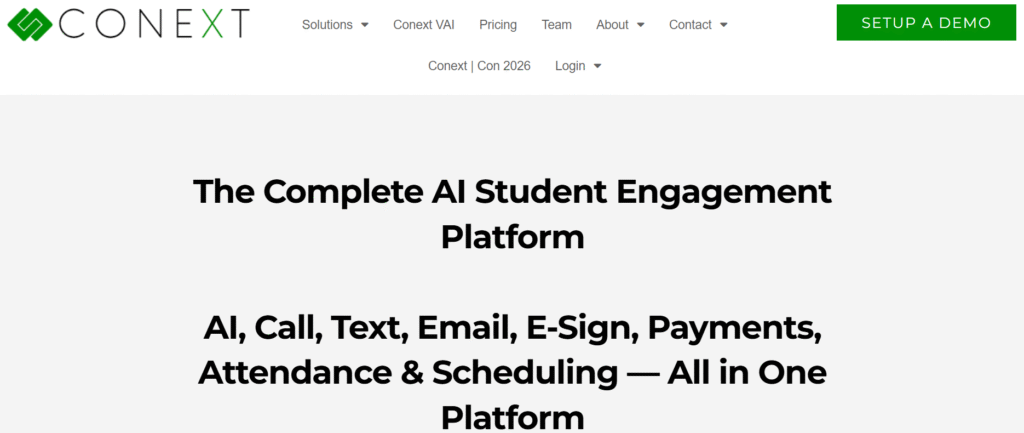
Your competitors are already winning with modern tools. They’re sending personalized text messages, deploying AI chatbots that answer questions at midnight, and automatically scheduling campus tours based on student interests. While you’re exporting spreadsheets, they’re converting prospects into enrolled students with seamless, automated experiences that today’s digital-native students expect.
The market for Conext alternatives has exploded in 2025 for just this reason. Innovative universities aren’t merely changing vendors; they’re radically reevaluating how technology might improve student engagement, recruit more intelligently, and enroll more students with the same (or smaller) teams. This guide provides you with what you really need: assessments of the leading Conext competitors, clear criteria for evaluation, and helpful guidance on how to match the ideal platform to your institution’s unique requirements.
Why colleges and universities are looking for Conext alternatives
Many institutions have found Conext to be a dependable platform, but as technology has advanced and needs have changed, schools are now reevaluating their CRM strategies. The following are the main factors influencing the hunt for higher education Conext CRM substitutes:
Limited customization and scalability
Institutions require CRM systems that scale easily as their programs expand and diversify. Conext’s customization choices don’t always fit the particular requirements of various academic programs or distinct recruitment methods, according to some customers. More adaptable systems that can accommodate different enrollment procedures are frequently being preferred by schools that provide online courses, numerous degree levels, or continuing education programs.
Integration challenges
Financial aid platforms, learning management systems (LMS), marketing automation tools, and student information systems (SIS) are all integrated technologies that are essential to modern higher education institutions. Managing data silos and duplicate input effort is what happens when a CRM doesn’t work well with these crucial systems. Integration issues are a major worry for many organizations looking for reasonably priced Conext substitutes.
Financial limitations
Budgets for higher education are coming under more strain. Every line item, including investments in technology, is being closely examined by institutions. Implementation, licensing, and continuing support fees can mount up rapidly. Conext solutions that offer strong functionality without enterprise-level pricing are especially needed for enrollment management at smaller colleges and regional universities.
Demand for omnichannel, mobile-first engagement
Prospective students today connect via a variety of platforms, including WhatsApp, social media, text messaging, and email. With the availability of mobile-optimized services and prompt responses, students anticipate that institutions will meet them where they are. Because traditional CRM solutions weren’t necessarily designed with this omnichannel reality in mind, schools are looking for more contemporary, adaptable options.
Advanced analytics and automation
Teams in charge of enrollment must accomplish more with less. Staff can focus on high-touch, individualized interactions when mundane tasks like lead routing, follow-up reminders, application progress updates, and nurture campaigns are automated. Furthermore, AI-driven insights and predictive analytics assist organizations in identifying the most promising candidates and streamlining their admissions processes. These are the areas where top Conext competitors usually shine.
What to Look for in a Conext Competitor
Not all higher education CRMs are created equal. When evaluating Conext competitors, consider these essential features and capabilities:
Comprehensive admissions automation
Look for platforms that automate the entire admissions funnel—from initial inquiry capture and lead scoring to application reminders, document collection, and enrollment confirmation. Automation reduces manual workload, minimizes errors, and ensures no prospective student falls through the cracks.
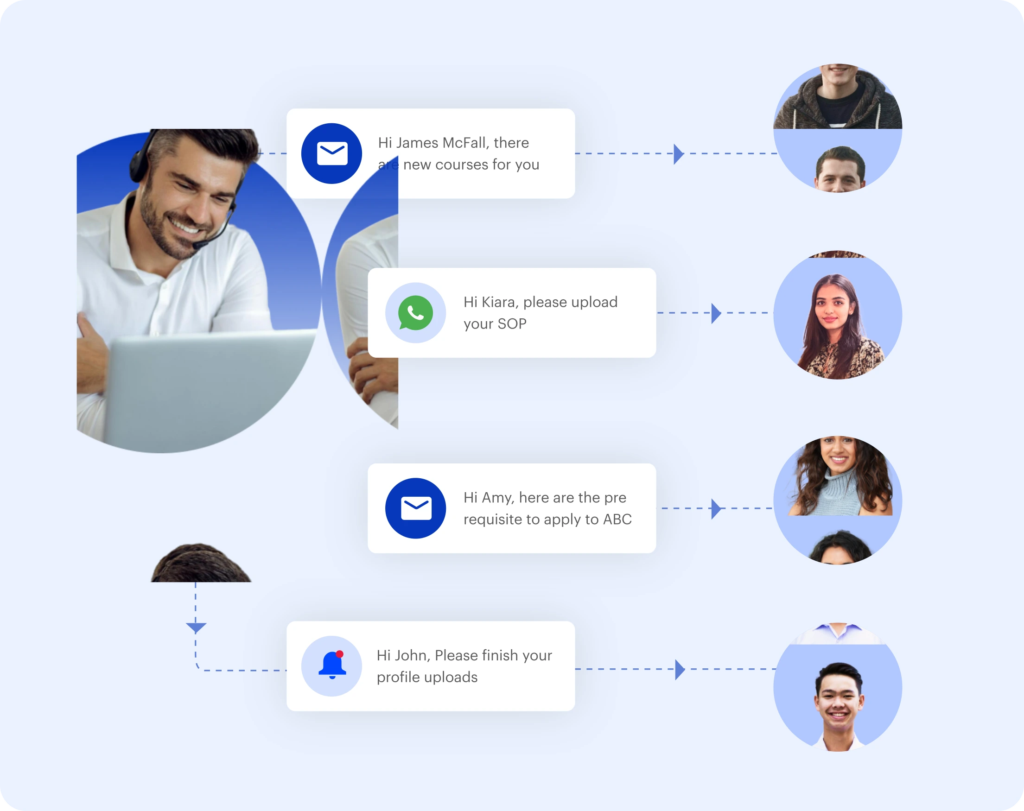
Complete student lifecycle management
The best alternatives don’t just focus on admissions. They support the entire student journey, from prospective student through enrollment, retention, graduation, and alumni engagement. This holistic approach provides better data continuity and enables long-term relationship building.
Omnichannel communication capabilities
Your CRM should enable seamless engagement across email, text, WhatsApp, social media, and voice messages. Prospective students should be able to start a conversation on one channel and continue it on another without repeating information. Mobile optimization and omnichannel sync are non-negotiable.
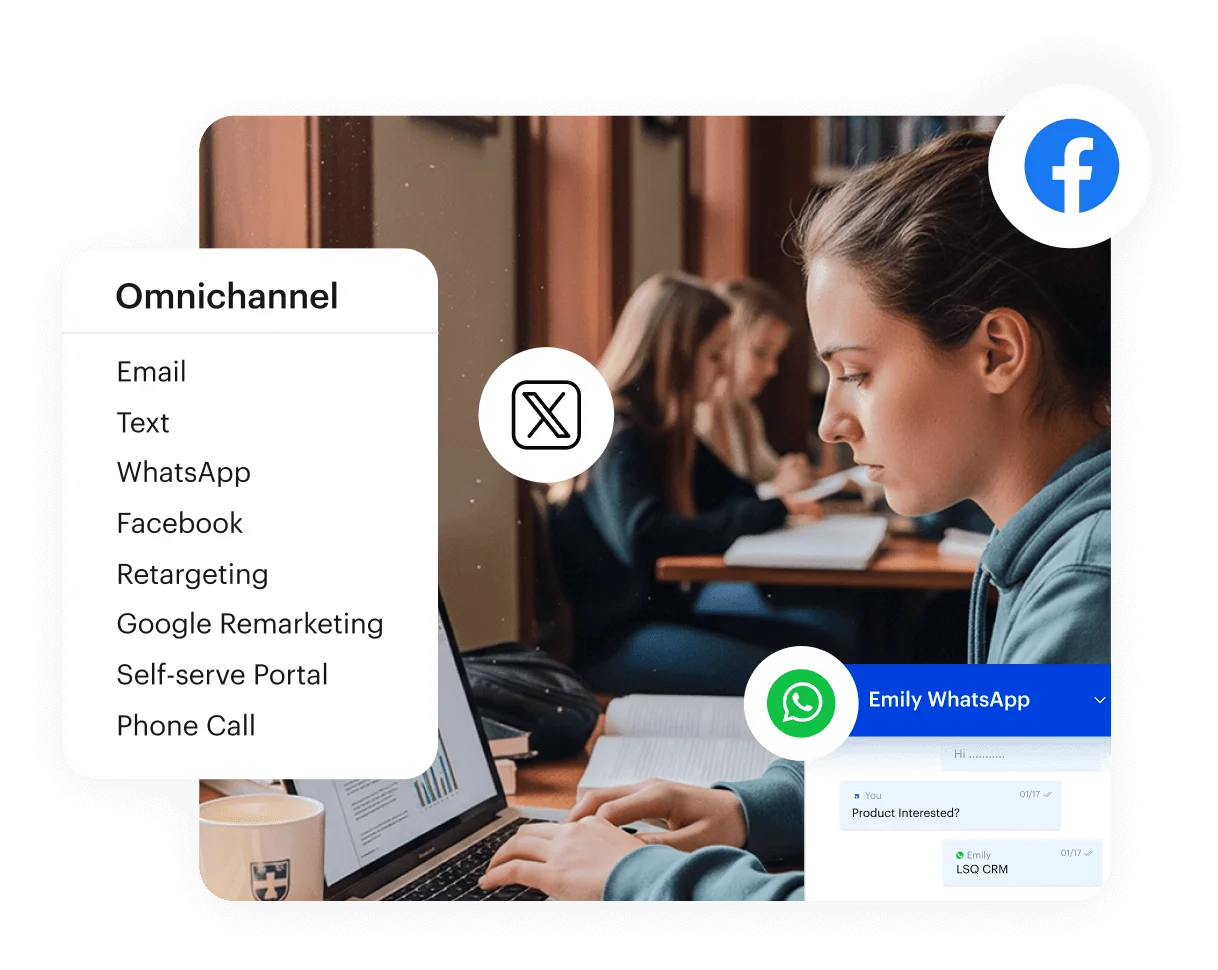
Robust integration ecosystem
Evaluate how well each platform integrates with your existing technology stack. Native integrations with popular SIS platforms (Ellucian, Workday Student, Jenzabar), LMS systems (Canvas, Blackboard, Moodle), and financial aid tools will save time and reduce frustration.
User-friendly interface
Even the most powerful CRM is only valuable if your team actually uses it. Look for intuitive dashboards, easy navigation, and minimal training requirements. Solutions with mobile apps for admissions counselors working events or conducting off-campus visits are particularly valuable.
Cost-effectiveness and transparent pricing
Understand the total cost of ownership, including implementation, training, support, and any per-user or per-contact fees. The right Conext replacement for small colleges should deliver strong ROI without hidden costs or complicated pricing structures.
Scalability for future growth
Choose a platform that can grow with your institution. Whether you’re planning to launch new programs, expand into international recruitment, or increase enrollment targets, your CRM should scale accordingly without requiring a complete platform migration.
Top Conext alternatives in 2025
Let’s explore the leading platforms that institutions are considering as they evaluate Conext competitors for their admissions teams.
1. LeadSquared, with the combined power of FloStack
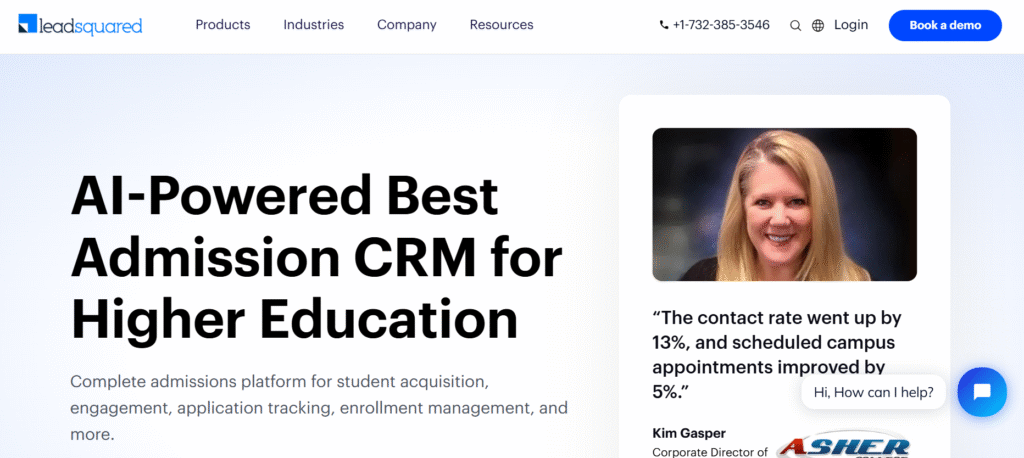
Best for: Mid-sized to large institutions seeking automation, affordability, and higher education specialization
LeadSquared Higher Education CRM has emerged as a powerful Conext alternative for colleges and universities looking to modernize their recruitment and admissions processes. Built specifically for education, the platform offers end-to-end automation tailored to the unique enrollment management needs.
Additionally, FloStack by LeadSquared gives it another layer of intelligence. It is designed especially for educational institutions that desire scheduling that goes beyond simply reserving a time slot. Scheduling becomes an actual component of your student engagement plan when you use FloStack.
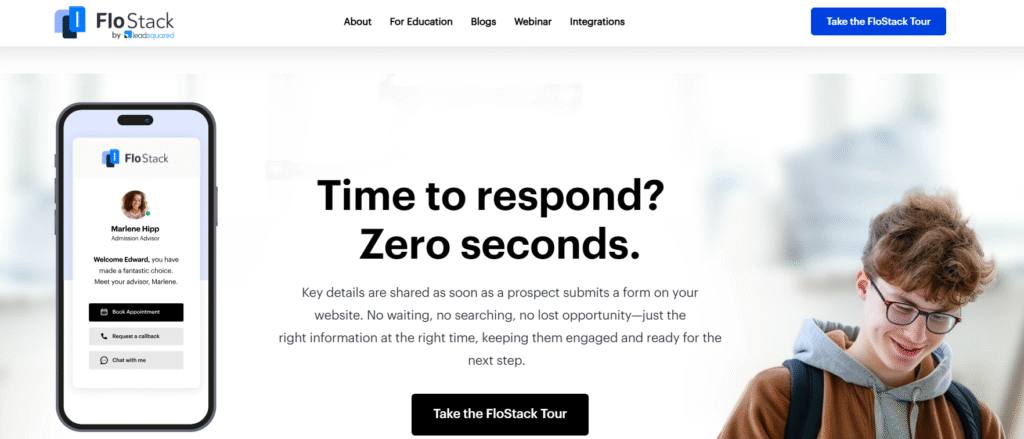
Key Strengths:
- Purpose-built for higher education: Unlike generic CRMs adapted for education, LeadSquared was designed with admissions workflows in mind, including inquiry management, application tracking, and enrollment conversion.
- Omnichannel engagement: Reach prospective students through email, SMS, WhatsApp, voice, and social media—all from a single platform with unified conversation histories.
- Mobile-first architecture: Admissions counselors can access full CRM functionality from mobile devices, making it ideal for college fairs, campus visits, and remote recruitment.
- Advanced automation: Streamline lead assignment, follow-up sequences, document collection, and status updates with sophisticated yet easy-to-configure automation rules.
- Transparent pricing: LeadSquared offers competitive, predictable pricing that works for institutions of various sizes, making it an attractive option for budget-conscious schools.
The platform also includes robust analytics and reporting capabilities, giving enrollment leaders real-time visibility into recruitment metrics, conversion funnels, and counselor performance. For US-based institutions, LeadSquared provides dedicated support and solutions tailored to the American higher education market.
2. Ellucian
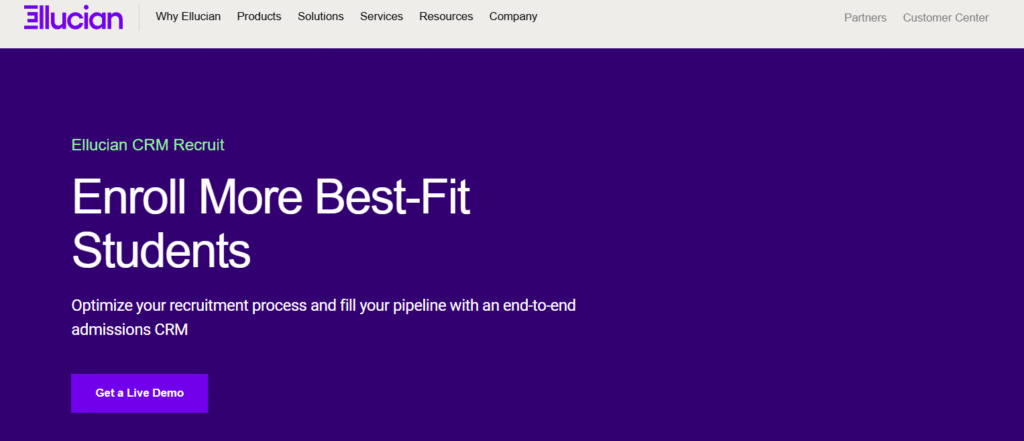
Best for: Institutions already using Ellucian’s student information systems
Ellucian CRM Recruit is purpose-built for higher education recruitment and integrates seamlessly with Ellucian’s Banner and Colleague student systems, making it a natural choice for institutions in the Ellucian ecosystem.
Key Strengths:
- Native integration with Ellucian Banner and Colleague SIS platforms.
- Configurable recruitment campaigns and communication workflows.
- Built-in analytics and reporting for enrollment management.
Considerations: Ellucian CRM works best when paired with other Ellucian products. Institutions using different SIS platforms may find integration more challenging. Implementation timelines can be lengthy, and the interface may feel less modern compared to newer competitors.
3. TargetX
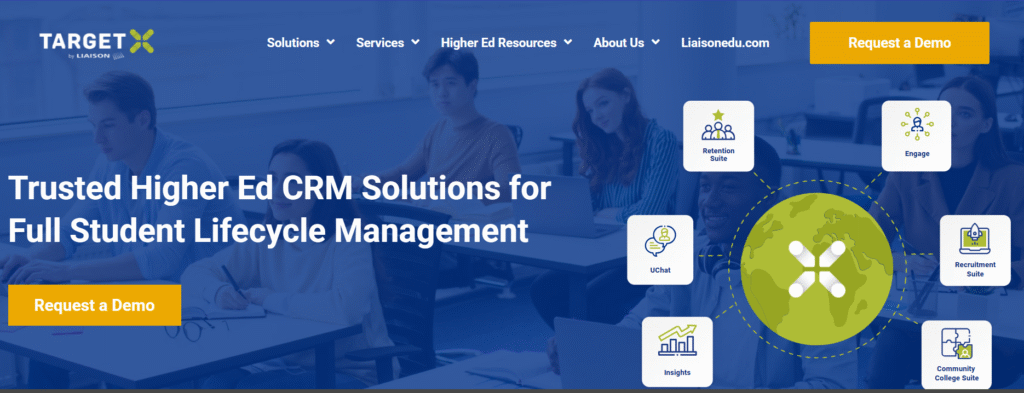
Best for: Mid-sized institutions wanting Salesforce power with higher ed expertise
TargetX delivers higher education-specific solutions built on the Salesforce platform, combining Salesforce’s enterprise capabilities with pre-configured admissions workflows designed for colleges and universities.
Key Strengths:
- Purpose-built admissions and enrollment management on Salesforce infrastructure.
- Student lifecycle management from inquiry through enrollment.
- Access to Salesforce’s broader ecosystem while maintaining education focus.
Considerations: While more affordable than custom Salesforce implementations, TargetX still represents a significant investment. Organizations get less flexibility than pure Salesforce but more education-specific functionality out of the box.
If you’re looking for TargetX alternatives, read: Best TargetX Alternatives & Competitors
4. Salesforce
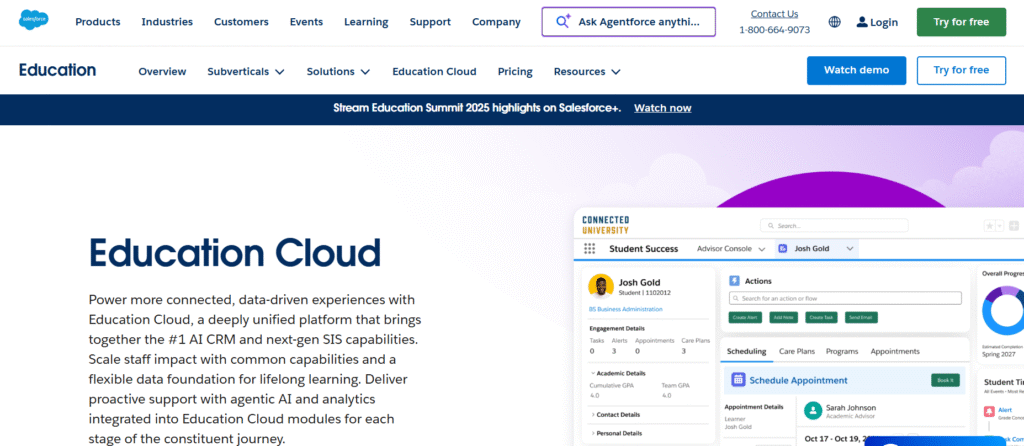
Best for: Large universities seeking enterprise-grade customization
Salesforce Education Cloud brings enterprise CRM power to higher education with Education Cloud, a specialized version of its platform built for student success.
Key Strengths:
- Customizable and extensible platform
- Massive ecosystem of third-party integrations and apps
- Supports entire student lifecycle, from recruitment to alumni relations
Considerations: Salesforce requires substantial investment in licensing, implementation, and ongoing customization. It typically requires dedicated Salesforce administrators or developers. The platform may not work for smaller institutions with straightforward needs.
5. Mongoose (formerly Intead Recruit)
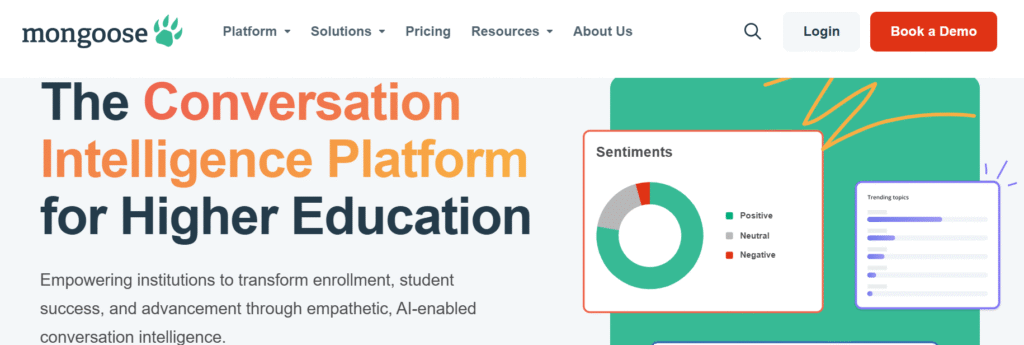
Best for: Community colleges and open-access institutions prioritizing accessibility
Mongoose specializes in serving community colleges and open-access institutions with an affordable, streamlined CRM that focuses on what these schools need most: efficient student communication and straightforward enrollment tracking.
Key Strengths:
- Designed specifically for community college workflows and open enrollment.
- Simplified interface requiring minimal training.
- Strong text messaging and mobile communication features.
Considerations: Mongoose lacks the advanced features and customization of enterprise platforms. Four-year institutions with complex admissions processes may find it too basic. The reporting capabilities are adequate but not as robust as competitors.
Conext vs. Competitors: An overview
| Feature | LeadSquared | Ellucian CRM Recruit | Salesforce Education Cloud | TargetX | Mongoose |
| Automation capabilities | Sophisticated, easy-to-configure automation | Standard automation for admissions workflows | Essential integrations, but more limited marketplace | Pre-configured automation with Salesforce flexibility | Basic automation for essential workflows |
| Omnichannel engagement | Strong text messaging and mobile-first communication | Solid communication tools integrated with campus systems | Enterprise-grade multi-channel capabilities | Robust multi-channel capabilities through Salesforce platform | Strong text messaging and mobile-first communication |
| Integration ecosystem | Excels at native integration with popular higher ed systems | Excels at native integration with Banner and Colleague systems | Broad integration marketplace | Bridges Salesforce’s ecosystem with higher ed needs | Essential integrations but more limited marketplace |
| Ease of use | Intuitive interface with quick user adoption | Moderate learning curve | Significant technical expertise and ongoing training required | Moderate learning curve | Most customization potential, but requires technical expertise |
- Automation capabilities: LeadSquared leads in sophisticated, easy-to-configure automation, while Salesforce offers the most customization potential but requires technical expertise and a bigger budget.
- Omnichannel engagement: LeadSquared and Mongoose offer strong text messaging and mobile-first communication. TargetX provides robust multi-channel capabilities through the Salesforce platform, while Ellucian delivers solid communication tools integrated with campus systems.
- Integration ecosystem: Salesforce has a broad integration marketplace. LeadSquared and Ellucian CRM excel at native integration with popular higher ed systems, while TargetX bridges Salesforce’s ecosystem with higher ed needs. Mongoose offers essential integrations but a more limited marketplace.
- Ease of use: LeadSquared and Mongoose are known for intuitive interfaces and quick user adoption, making them accessible for teams without extensive technical resources. Ellucian and TargetX have moderate learning curves, while Salesforce requires significant technical expertise and ongoing training.
- Cost-effectiveness: LeadSquared and Mongoose typically offer the best value for small to mid-sized institutions and community colleges. Ellucian pricing is competitive for existing Ellucian customers but can be costly for new implementations. TargetX and Salesforce command premium pricing suitable for well-resourced institutions.
- Higher education focus: LeadSquared, Ellucian, TargetX, and Mongoose were all built specifically for education, with deep understanding of admissions workflows and compliance requirements. Salesforce Education Cloud is adapted from the general business CRM platform, though TargetX adds education-specific configuration on top of that foundation.
In essence
As higher education becomes increasingly competitive and student expectations continue to evolve, having the right CRM platform isn’t just a nice-to-have—it’s essential for enrollment success. While Conext has served many institutions well, the growing demand for Conext alternatives reflects the reality that one-size-fits-all solutions no longer meet the diverse needs of today’s colleges and universities.
Whether you’re a small liberal arts college seeking affordable automation, a large research university requiring enterprise-grade customization, or a mid-sized institution looking for the perfect balance of functionality and cost-effectiveness, there’s a Conext competitor designed for your specific situation.
LeadSquared stands out as a compelling choice for institutions seeking purpose-built higher education functionality, sophisticated automation, true omnichannel engagement, and transparent, affordable pricing. With its mobile-friendly architecture and dedicated focus on enrollment management, it helps admissions teams work smarter, engage students more effectively, and achieve their enrollment goals.
The future of higher education enrollment is automated, personalized, and omnichannel. Make sure your institution has the right tools to succeed.
Take the next step: Schedule a personalized demo to see how LeadSquared can transform your student engagement and enrollment processes.
FAQs on Conext competitors
What are the best Conext alternatives?
The best Conext alternatives for higher education include LeadSquared, Ellucian, Salesforce, TargetX, Mongoose, among others. The right choice depends on your institution’s size, budget, and specific enrollment needs.
What are the best Conext alternatives for student recruitment and admissions management?
Several CRM and marketing automation platforms serve as strong Conext alternatives, especially for institutions looking to scale their admissions and enrollment processes. Among them, LeadSquared stands out for its end-to-end enrollment automation, advanced lead scoring, and robust reporting tools. It helps education teams manage the complete student journey — from inquiry to enrollment — all in one unified platform.
Why switch from Conext CRM?
Institutions switch from Conext to access better automation capabilities, more flexible integrations, improved omnichannel engagement tools, more competitive pricing, or platforms specifically designed for modern higher education recruitment challenges.
Which Conext competitors are most affordable?
HubSpot (basic tier) and LeadSquared offer the most affordable options for small to mid-sized institutions, providing strong functionality without enterprise-level costs. Both platforms offer transparent pricing and good ROI.
How do Conext alternatives improve student engagement?
Modern Conext alternatives provide omnichannel communication across email, text, WhatsApp, and social media, along with AI-driven personalization, mobile-optimized experiences, and automated yet personalized nurture campaigns that meet students where they are.
How does LeadSquared compare to Conext in improving enrollment conversion?
While Conext focuses primarily on communication and engagement, LeadSquared goes a step further by offering built-in automation, predictive analytics, and customizable workflows tailored to admissions teams. These features help institutions not only streamline processes but also improve enrollment conversion rates by ensuring no prospective student slips through the cracks.







